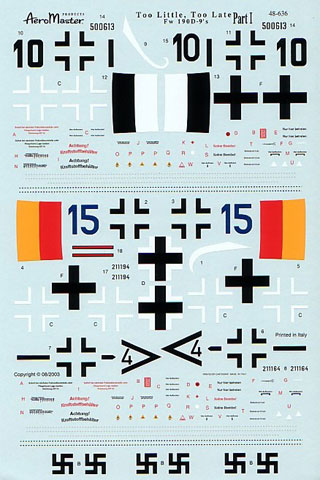|
S u m m a r y
|
| Catalogue
Number: |
AeroMaster decal sheet
48-636 and 32-012 “Too Little, Too Late, Fw 190D-9’s” Part 1 |
| Scale: |
1/32 and 1/48 |
| Contents and Media: |
Double-sided full colour
letter-sized instructions plus notes sheet; 1 x full-size decal
sheet (2 x decal sheets in 1/32 scale releases. |
| Price: |
48-636 USD$9.00
from Aeromaster Website
32-012 USD $10.00 from Aeromaster Website |
| Review Type: |
FirstLook |
| Advantages: |
Perfect register, thin
carrier film, full stencil data; alternate style numbers provided
for Black 10 |
| Disadvantages: |
Updated information needed
for one option. |
| Recommendation: |
Recommended |
Reviewed by Rob Baumgartner

"Too Little, Too Late" 1/48 & 1/32 Fw 190D-9 Decals are available online
from Squadron.com
This is Part 1 of at least three new sheets from AeroMaster Decals,
focusing on the Fw 190D-9 “Dora”.
No doubt the popularity of the subject has been heightened by the recent
release of the Hasegawa Fw 190D-9 in the larger scale.
This release is available in both 1/32 scale and 1/48 scale.
Three subjects are catered for and each is clearly represented with a
colour profile and description:
Focke-Wulf Fw 190D-9 of II/JG301 (sic),
Straubing, Bavaria, spring, 1945.
 A
bit of a controversial aircraft this one. The instructions give the upper
surface colours as RLM 83 Dark Green and RLM 75 Grey Violet. RLM 76 is
used for the lower surfaces as well as the light mottle along the fuselage
and tail. The spinner displays a black/white spiral and the fuselage
carries JG301’s yellow and red RVD bands. A
bit of a controversial aircraft this one. The instructions give the upper
surface colours as RLM 83 Dark Green and RLM 75 Grey Violet. RLM 76 is
used for the lower surfaces as well as the light mottle along the fuselage
and tail. The spinner displays a black/white spiral and the fuselage
carries JG301’s yellow and red RVD bands.
The fuselage Balkenkreuze is a black outline B4 type. The under wing
Balkenkreuze is a black/white 800mm B3 style with the upper wing version
consisting of the standard 910mm B6 white outline.
Latest research informs us that this aircraft was “Yellow 15” of 3./JG301,
(I Gruppe) W.Nr. 500 666.
One photo from which the aircraft profile comes from gives the impression
of a II Gruppe bar on the fuselage but another photo shows that this is
not so.
Further details surrounding the colours of this interesting aircraft can
be found at:
http://www.stormbirds.com/experten/research1.htm
Focke-Wulf Fw 190D-9 of II/JG6,
Furth, Germany, Spring 1945.
Very interesting markings adorn this aircraft. The finish is stated as
being RLM 83 Dark Green and RLM 75 Grey-Violet on the upper surfaces and
RLM 76 Light Blue on the lower surfaces. Again a light mottle is used for
the fuselage and tail but this time in RLM 83 Dark Green. The fuselage
extension plug has been deliberately over painted in another colour and is
depicted as Dark Grey.
No spiral is applied to the spinner and the unusual fuselage code was
applied in black with a white outline.
Simplified National insignia was applied, consisting of the usual B4 style
black outlines for the fuselage Balkenkreuze and white outlined 910mm B6
types for the ones on the upper wing. The lower wings feature the solid
black simplified 900mm B1b style. As expected, the standard H3 type 420mm
Hakenkreuze is displayed on the tail.
Focke-Wulf Fw-190D-9 of II/JG26,
abandoned at Celle, Spring, 1945.
This aircraft is depicted wearing the lower contrast scheme of RLM 81
Brown-Violet and RLM 83 Dark Green on the fuselage. Rightfully AeroMaster
question whether these colours were repeated on the wing upper surfaces.
Photos clearly show that this scheme was not followed and that one of the
colours could indeed have been RLM 76 as stated in one of the references
quoted. A photo on page 75 of the Squadron/Signal Publications “Walk
Around” on the Dora shows this contrast.
Heavy weathering covers the fuselage mottle and apparently this mottle
extends to the undercarriage doors.
Photos of this machine after it’s capture by the Americans suggest that
the doors also might have been tarnished metal.
Markings consist of the black/white RVD bands around the fuselage with the
aircraft number and Gruppe bar also being black. There is speculation that
the numeral may have been of a different style on each side of the
fuselage. This idea coming from photos of the airframe seen before and
after the National Insignia was painted out. Thoughtfully AeroMaster
recognize this and supply an alternative. Nice touch.
The fuselage Balkenkreuze is again the B4 black outline type and the
Hakenkreuze is the familiar 420mm solid black H3 style. The upper wings
were the standard 910mm B6 Balkenkreuze while those below follow the
simplified 900mm B1b pattern.
There is enough stencil data for two complete aircraft and this is always
a welcome addition from any manufacturer. Despite the small size, all
lettering was perfectly legible.
The decals are printed in perfect register and the colour density looks
good. Previous experience shows that the thin carrier film allows the
decal to conform nicely to the model’s surface and will accept softening
solutions without protest.
This is another well-printed decal sheet from Aeromaster.
With parts II and III to follow, a comprehensive collection of markings
will be available for those who missed out on Dora markings the first time
around.
Recommended
Review Text Copyright © 2002 by
Robert Baumgartner
Page Created 01 October, 2003
Last updated
01 October, 2003
Back to
HyperScale Main Page |
Home | What's
New | Features
| Gallery |
Reviews | Reference
| Forum
| Search